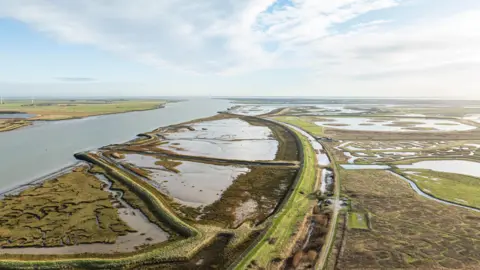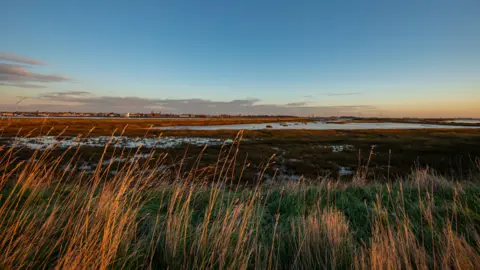Nature reserve could expand by 140 football pitches
 PA Media
PA MediaA marshland nature reserve built with the help of more than three million tonnes of soil from the Crossrail scheme could be expanded.
Plans have been made to grow RSPB Wallasea Island, a 740-hectare reserve at Rochford in Essex, by 100 hectares - about the size of 140 football pitches.
After the purchase of four fields to the west of the site, RSPB conservationists said they planned to create a six-hectare lagoon in the easternmost of the four fields.
The other three fields were set be developed into a mixed scrub or grassland mosaic with additional wet areas.
 PA Media
PA MediaThe reserve was originally created using vast amounts of material excavated during the construction of tunnels beneath London for the Elizabeth line.
It was brought to Wallasea by ship and used to raise land levels as well as create salt marsh, islands and mudflats at the Crouch and Roach estuaries.
The RSPB hoped an expansion could provide further habitat to rare and threatened wildlife such as lapwings, redshanks and avocets.
It added the new lagoon would also provide the reserve's first body of freshwater.
Site manager at Wallasea Island, Rachel Fancy, said: "We are incredibly grateful to the Ida Davis Family Foundation for giving us the money to buy the land adjacent to the reserve.
"This is an exciting project which will allow us to create vital new habitats, adding to the mix of wildlife already present on the reserve."
The island was originally developed on land owned by Wallasea Farms, who also owned the newly purchased fields.
The farm owners wanted to sell the land due to the effects of climate change on coastal areas, with the low seawall on the south of the island making the land susceptible to sea level rise.
Ken Davis, of the Ida Davis Family Foundation, said: "Our funding will help create a freshwater lagoon on the peninsula, which will lead to an increase in visiting waders and allow more visitors to connect with nature.
"My mother, after whom our foundation is named, was a local Leigh on Sea resident and a nature lover, and she would very much have appreciated and enjoyed this commitment to our local wildlife."
Follow Essex news on BBC Sounds, Facebook, Instagram and X.
